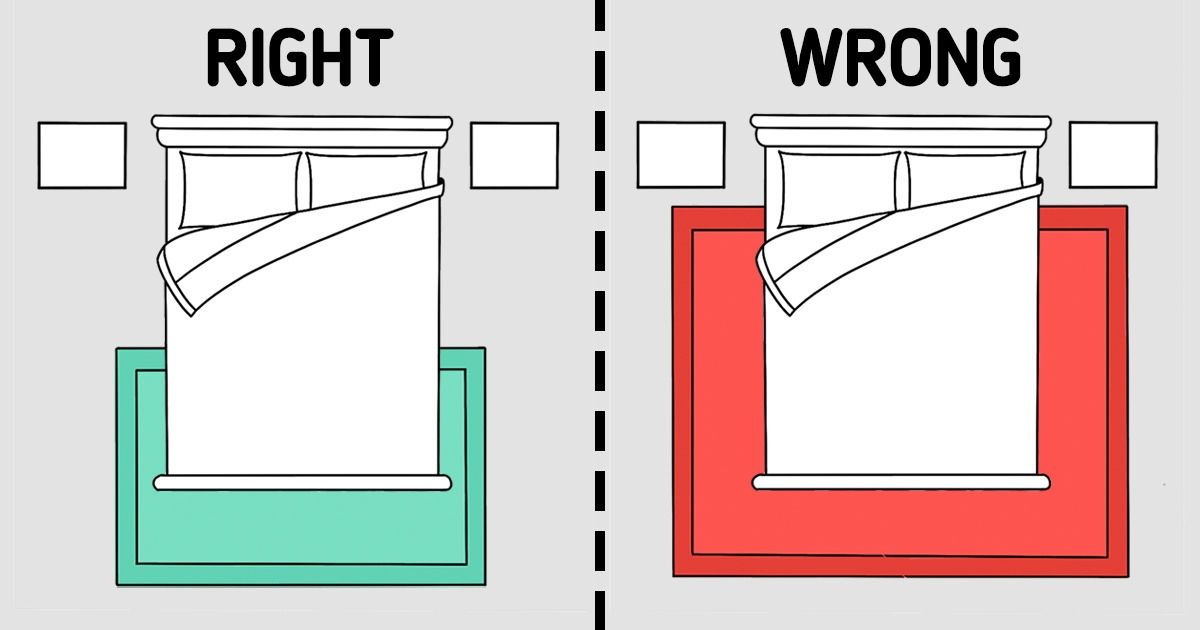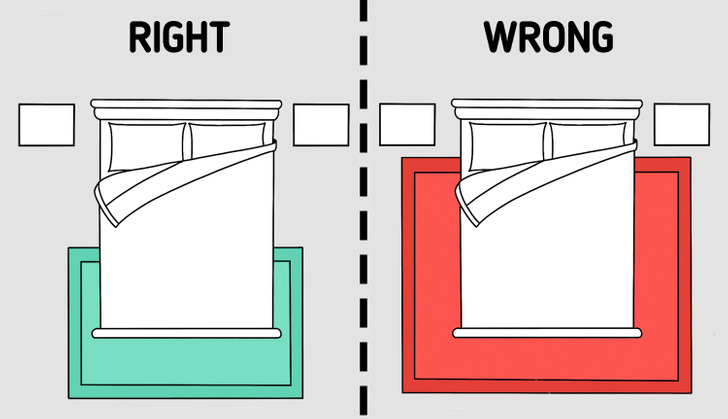Greatest home earning method for all of you if you really want to makes extra dollars every week online. i have joined this job .......


Tossing and turning at night is a common experience that many of us have encountered. Sleep is crucial for maintaining our health and overall well-being, but for numerous individuals, achieving a restful night’s sleep can be a daunting task. It’s not as simple as just avoiding a late-night cup of coffee; seemingly harmless habits can also interfere with our ability to fall asleep quickly and wake up feeling refreshed. At Bright Side, we understand the struggle of sleepless nights, and we decided to delve into the potential causes behind this common issue.
First and foremost, it’s essential to emphasize the significance of sleep. Sleep is not merely a luxury but a fundamental necessity for our bodies and minds. It is during sleep that our bodies engage in critical processes such as repairing tissues, consolidating memories, and regulating hormones. A lack of sleep can have severe consequences, including reduced cognitive function, mood disturbances, and an increased risk of chronic health conditions.
For many individuals, falling asleep quickly remains a distant dream. The ability to drift off into slumber is influenced by a myriad of factors, including stress, anxiety, and lifestyle choices. While some people can seemingly fall asleep the moment their head hits the pillow, others may toss and turn for hours before succumbing to sleep’s embrace. Understanding the obstacles to a good night’s sleep is the first step in addressing this issue.
We undertook some research to uncover the potential culprits behind sleep difficulties. This research likely involved investigating common sleep disruptors and offering practical solutions to combat them. Bright Side’s commitment to addressing this issue highlights the importance of promoting healthy sleep habits and improving overall well-being.

Having carpets in your bedroom can be a double-edged sword. On one hand, they can add a warm and inviting ambiance to your space, making it feel cozier and more comfortable. However, it’s important to be aware that carpets can also be a magnet for dust, dirt, and allergens. Modern carpets may emit volatile organic compounds (VOCs) that can cause smell and irritation, especially in sensitive individuals.
Due to their fibrous nature, carpets are excellent at trapping dust particles and allergens. Over time, these particles accumulate deep within the carpet fibers. This buildup of dust and allergens can be problematic for individuals with allergies or respiratory sensitivities. When you step on the carpet, or even just move around in the room, these particles can become airborne, potentially leading to coughing, sneezing, and difficulty breathing.
The potential for these allergens to disturb your sleep is significant. Imagine lying in bed, trying to relax and drift off to sleep, but instead, you’re struggling with a persistent cough or experiencing wheezing due to allergens stirred up by the carpet. This discomfort can significantly disrupt your sleep patterns, leaving you feeling fatigued and irritable the next day.
In addition to opting for smaller rugs, regular maintenance is crucial. Vacuuming your bedroom carpet or rugs at least once a week can help reduce the presence of dust and allergens. If you have allergies, you may want to invest in a high-quality vacuum cleaner equipped with a HEPA filter, which is designed to capture tiny particles that can trigger allergies.
HEPA filters are a marvel of modern technology, renowned for their exceptional ability to cleanse the air we breathe. These filters are specifically designed to target and capture particles that are often too small to be trapped by standard air filters. As the name suggests, they offer High Efficiency Particulate Air filtration, setting a standard for air purification that removes more than 99.9% of the particles from the air stream that passes through them.
HEPA filters offer exceptional air purification capabilities. They effectively trap allergenic particles, such as pollen, pet dander, mold spores, and dust mites, providing relief to allergy sufferers and improving indoor air quality.
Additionally, HEPA filters can capture tiny airborne pathogens like viruses and bacteria, making them vital in the fight against infectious diseases. Beyond biological contaminants, HEPA filters also target chemical compounds and volatile organic compounds (VOCs), essential for a healthy indoor environment.
They are highly efficient at filtering out common pollutants like dust, fine particulate matter, and even smoke from cooking or wildfires. What sets HEPA filtration apart is its ability to capture extremely fine particles, including those in the micron and submicron range, making it effective against even the tiniest airborne threats.
The allure of sleeping in on the weekends is undeniable, especially for those who diligently wake up early during the workweek to meet professional commitments. The idea of indulging in a few extra hours of slumber can be incredibly tempting, offering the promise of catching up on much-needed rest. However, it’s important to recognize that this habit may have unintended consequences for your overall sleep quality and well-being.
Our bodies operate on a natural, internal clock known as the circadian rhythm. This internal clock regulates our sleep-wake cycle and other bodily functions. It relies on consistency and routine. When you abruptly alter your sleep schedule on weekends by staying up late and sleeping in, you disrupt this delicate balance.
While enjoying the luxury of a few extra hours of sleep on weekends can provide short-term satisfaction, it often comes at a cost. Going to bed later on Friday and Saturday nights can confuse your body’s internal clock. This inconsistency can lead to what is commonly referred to as “social jetlag,” where your body struggles to adapt to different sleep patterns on weekends compared to weekdays. The consequence of this disruption is that it can impact your sleep quality in the long run. Irregular sleep patterns can result in fragmented and less restorative sleep. Even if you manage to sleep in, you may not experience the same level of rejuvenation as you would with a consistent sleep schedule.
There is an alternative approach — maintaining a more consistent sleep schedule throughout the week, including weekends. By going to bed and waking up at similar times, you help your body establish a predictable routine. Over a few weeks, your body’s internal clock can adjust to this pattern, allowing you to wake up feeling refreshed without the need for an alarm clock.
The long-term benefits of a consistent sleep schedule are significant. Not only can it improve your overall sleep quality, but it can also enhance your daytime alertness and productivity. Additionally, it can have positive effects on your mood, cognitive function, and physical health.
The decision to follow a dairy-free diet is increasingly popular, driven by various factors such as lactose intolerance, allergies, ethical concerns, or personal dietary preferences. Many people have found relief from digestive issues or other health problems by eliminating dairy products from their diet. However, it’s important to be aware of potential implications, including their impact on sleep.
While going dairy-free can have numerous health benefits, it’s worth noting that dairy products, particularly milk, contain a sleep-promoting compound known as melatonin. Melatonin is a hormone produced by the pineal gland in the brain, and it plays a crucial role in regulating our sleep-wake cycle. It’s often referred to as the “sleep hormone” because it signals to the body when it’s time to sleep.
Melatonin levels naturally rise in the evening as it gets darker, preparing the body for sleep. However, for individuals who may have difficulty falling asleep, melatonin supplements are a common remedy. These supplements can help regulate sleep patterns and are often used to treat insomnia.
A classic remedy for those on a dairy-free diet who want to support their sleep naturally. Drinking a glass of warm milk before bedtime is a well-known tradition for promoting sleep. Beyond melatonin, milk also contains other sleep-supporting nutrients such as tryptophan, an amino acid precursor to melatonin, and calcium, which plays a role in regulating melatonin production.
For those who are dairy-free and reluctant to consume supplements, there are alternatives to consider. There are dairy-free milk options available, such as almond milk, soy milk, or oat milk, that can be heated and consumed in the same way as traditional milk. Additionally, certain foods, like bananas and cherries, also contain natural melatonin and can be included in a dairy-free diet to support sleep.
It’s important to emphasize that dietary choices are highly individual. While dairy products can be a source of melatonin, there are numerous ways to maintain a dairy-free diet and still promote healthy sleep. It’s all about finding the right balance between dietary preferences and overall well-being.
During colder months or when the weather outside is chilly, the instinct to keep warm is entirely natural. We often seek comfort in the form of heavy blankets and the soothing hum of a heater. This warmth can feel cozy and comforting as we prepare for a good night’s sleep.
Surprisingly, however, research suggests that sleeping in a slightly cooler bedroom can have significant benefits for the quality of our sleep. Studies have consistently shown that cooler sleeping environments are associated with improved sleep patterns and more restful slumber.
The human body undergoes changes in temperature throughout the sleep cycle. It naturally cools down as part of the body’s sleep-wake regulation. A cooler room temperature can facilitate this process, allowing your body to adjust to its natural temperature fluctuations more effectively.
Quality sleep is characterized by cycles of deep and REM (Rapid Eye Movement) sleep. A cooler sleeping environment can encourage these sleep cycles, contributing to a more restorative night’s sleep. In contrast, a warm or overly heated room can disrupt these sleep patterns, leading to restlessness and discomfort.
One interesting point is that bedroom temperature can have a more significant impact on your sleep than external noise. While external noise can certainly be disruptive, research suggests that temperature is a more potent factor in determining the quality of your sleep. The right temperature can create a conducive sleep environment, even in the presence of some noise.
It’s important to note that the ideal bedroom temperature can vary from person to person. The generally recommended range for a comfortable and sleep-promoting environment is around 60 to 67 degrees Fahrenheit (15 to 19 degrees Celsius). However, personal preferences and individual factors such as clothing and bedding can influence what feels comfortable to you.
Late at night, after a long and tiring day, the allure of a quick and satisfying snack can be hard to resist. Cravings for something sweet or savory might lead you to the kitchen, seeking comfort in food before heading to bed. However, it’s important to consider the potential effects that late-night eating can have on your sleep and overall well-being.
The relationship between food and sleep is intricate and worth understanding. Our bodies have a circadian rhythm that influences various biological processes, including digestion. Late-night eating can disrupt this natural rhythm, as the digestive system needs time to process and metabolize the food we consume.
Consuming food, especially heavy or high-sugar options, close to bedtime can lead to discomfort and indigestion. This discomfort can hinder your ability to fall asleep and stay asleep, ultimately affecting the quality of your rest. Additionally, certain foods might cause fluctuations in blood sugar levels, leading to wakefulness during the night.
It’s not about going to bed hungry, but rather about giving your body enough time to digest before sleep. Eating a meal about 4 hours before bedtime can strike a balance between satisfying your hunger and allowing your body to begin the digestion process well before you lay down to sleep.
If you’re hungry before bedtime, selecting sleep-friendly snacks can be a game-changer. These snacks provide nourishment without overloading your digestive system, promoting a more peaceful sleep experience. Here are some ideas:
Another aspect of mindful eating is tuning in to your body’s signals. Pay attention to your hunger and fullness cues. If you’re genuinely hungry, a light and nutrient-dense snack can be a wise choice. However, if you’re simply experiencing cravings or eating out of habit, it might be best to practice restraint, as unnecessary snacking can disrupt your sleep.
Mindful eating plays a pivotal role in achieving better sleep hygiene. Being conscious of when you eat and selecting sleep-friendly snacks can help prevent indigestion and promote a more restful sleep experience. By listening to your body’s cues and making informed choices, you can enjoy a bedtime snack that satisfies your hunger without compromising your sleep quality.
A hot shower is a cherished ritual for many, offering a luxurious and calming experience that washes away the stresses of the day. The sensation of warm water cascading over your body can be incredibly soothing, and it’s often associated with relaxation and unwinding.
As evening approaches and your bedtime draws near, your body undergoes a series of physiological changes to prepare for sleep. One of the crucial changes involves a drop in core body temperature. This temperature decline is part of your body’s natural sleep-wake cycle, signaling that it’s time to wind down and prepare for restorative sleep.
Taking a hot shower right before bedtime, while initially relaxing, can have unintended consequences for your sleep. The warmth from the shower raises your body temperature, essentially conflicting with your body’s natural cooling process as it readies itself for slumber. This abrupt change in temperature can confuse your internal clock, signaling that it’s not yet time to sleep.
The disruption in your body’s temperature regulation can hinder your ability to fall asleep quickly and maintain restful sleep throughout the night. When your body is unable to transition smoothly into the sleep state, you may experience restlessness, tossing and turning, or difficulty falling asleep altogether.
It is advised to prevent taking hot showers immediately before bedtime to avoid this temperature-related sleep disruption. However, it’s essential to balance the desire for relaxation with the need for a conducive sleep environment. If you enjoy hot showers, consider incorporating them into your evening routine, but try to do so at least an hour or more before bedtime to allow your body ample time to cool down.
For those who value the relaxation provided by hot showers but want to prioritize sleep, alternative bedtime rituals can be just as effective. Gentle activities like reading a book, practicing relaxation techniques, or taking a warm bath (not hot) can promote relaxation without interfering with your body’s natural sleep preparation.
In the modern age, electronic devices like smartphones, tablets, and laptops have become an integral part of our daily routines. We use them for work, entertainment, communication, and information access. However, the convenience and versatility of these devices have also made them a common presence in our bedrooms, often right before bedtime.
The use of light-emitting electronic devices in the hours leading up to bedtime can have profound consequences on our sleep patterns. These devices emit blue light, which closely resembles natural daylight. Exposure to this artificial light during the evening can deceive our brains into thinking it’s still daytime. Consequently, it disrupts our body’s internal sleep-wake cycle, making it difficult to fall asleep at the desired bedtime.
Our bodies are equipped with a finely-tuned internal clock known as the circadian rhythm. This clock coordinates various physiological functions, including sleep, based on environmental cues, primarily the presence or absence of light. The circadian clock plays a pivotal role in regulating when we feel alert and when we naturally become drowsy. When we expose ourselves to artificial light late into the night, it confuses this clock, signaling to our bodies that it’s not yet time to sleep.
Melatonin, often referred to as the “sleep hormone,” is produced by the pineal gland in response to darkness. It serves as a biological signal to initiate sleep. However, the use of light-emitting devices, especially those emitting blue light, can suppress melatonin production. This means that even when we’re physically in bed, our bodies may not receive the proper signals to initiate sleep, leading to prolonged periods of wakefulness and difficulty falling asleep.
The consequences of disrupted sleep patterns due to late-night device use are not limited to the nighttime hours. They extend well into the following day. When we fail to get adequate and restorative sleep, we often wake up feeling groggy and less alert. This reduced alertness can impact our ability to concentrate, make decisions, and perform effectively at work or in our daily tasks. Furthermore, it can result in daytime drowsiness, which can be hazardous, particularly if we need to operate vehicles or machinery.
To mitigate the adverse effects of electronic device use before bedtime, sleep experts recommend practicing good sleep hygiene. This involves setting a consistent sleep schedule, creating a calming bedtime routine, and limiting the use of light-emitting devices at least an hour or more before bedtime. Some individuals find success in using “night mode” or “blue light filter” settings on their devices, which reduce the amount of blue light emitted.
Do you usually sleep well at night? Do you have any tips for those who are struggling to fall asleep?
Greatest home earning method for all of you if you really want to makes extra dollars every week online. i have joined this job .......












